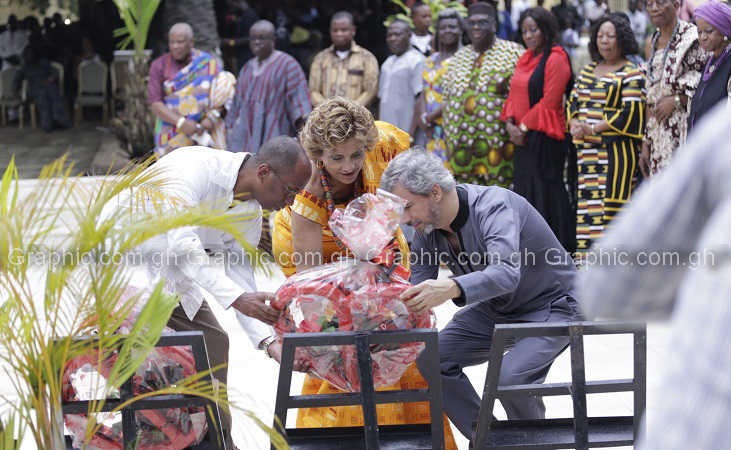
Wreath laying marks Emancipation Day
A solemn wreath-laying ceremony was yesterday held to mark the beginning of this year’s Emancipation Day celebration and PANAFEST, with a call on people of African descent to return to their roots and redefine emancipation as economic freedom, instead of the usual rhetoric.
Advertisement
Under a cloudy sky at the W.E.B. Du Bois Memorial Centre, the George Padmore Library and the Kwame Nkrumah Mausoleum in Accra, wreaths were laid on the tombs of Du Bois, Padmore and Dr Nkrumah for their roles in Pan-Africanism and the fight against colonialism.
Speaking at the ceremony, the Minister of Tourism, Mrs Catherine Afeku, rallied people of African descent to rekindle the spirit of emancipation and turn the pains of the past into the continent’s economic emancipation.
Economic freedom
“It is no longer a call to freedom fighting; it is a call for economic freedom. That is the true call for this festival. Let us prove to the world that, yes, we can. Let us come together with our minds and spirit and show the rest of the world that we are the custodians of civilisation,” she said.
In a speech that paid tribute to some of the continent’s forefathers, Mrs Afeku urged the Diasporans to see Emancipation Day celebrations as a clarion call to contribute to the economic liberalisation of Africa.
“What are those of us left behind doing? The Pan-African Festival is a clarion call for each and every one of us here to build upon the successes of our forefathers. What are we doing as a people to rekindle and hold on to the spirit of the African resilience?
“Yes, we went through the dark patches, yet we have survived. Now how are we building the economic emancipation? What are we doing as a people? How are we using the shame to fame? We survived and that should be the spirit of this Pan-African Festival, not the sadness of our forefathers,” she said.
She urged the Diasporans to see the unfortunate incident of the slave trade as a travel outside the continent but return home with the vast knowledge acquired in different fields to build the continent.
The Director of the Du Bois Centre, Mr Benyameen Sam Kielson, described Emancipation Day as a solid occasion that brought “nostalgic memories of how our forebears sacrificed their lives entirely for the liberation of the suffering Black race throughout the world”.
While acknowledging the heroic efforts of leaders of yore, including Thomas Clark, Martin Luther King Jr, Marcus Garvey, Du Bois and Nkrumah, he said it was unfortunate that some of today’s leaders had sacrificed those efforts on the altar of personal interest.
“Regrettably, our leaders have allowed their selfish interests to blind their vision against the collective interest of national and international Africa. This is the hard truth; if we don’t put our national and international interests ahead of our personal ones, we will remain underdeveloped and divided,” he stated.
For some of the Diasporans, it was a moment of tears and joy with the retracing their roots. They shed tears as they soaked in the speeches and watched the rhythmic dance moves of the Ghana Dance Company.
There was a symbolic ceremony to rename a Colombian ‘son of the soil’ from Sergio Mosquera to Kofi Sankofa.
Background
Emancipation was originally celebrated in the Caribbean to commemorate the final abolition of chattel slavery in the British colonies on August 1, 1834.
Ghana became the first African nation to join in the celebration in 1998 to re-affirm its status as the Gateway to the African Homeland of Diasporans.
Emancipation Day, therefore, became an annual festival and in the year in which the biennial PANAFEST is celebrated, the two are held together.
The slave trade resulted in the trans-shipment of millions of Africans as slaves from the continent to the Caribbean and Southern American states. These slaves were forced to work for their masters for nothing.
Ghana’s claim to the position of gateway to the homeland is well grounded in the fact that it was a major exit point for slaves on the West Coast in the period that the infamous trade took place.
Currently, about 40 forts, castles and lodges used for the slave trade are in existence in the country, with three of them — the St George’s Castle and the St Jago Fort, both at Elmina, and the Cape Coast Castle — designated by UNESCO as World Heritage sites.



